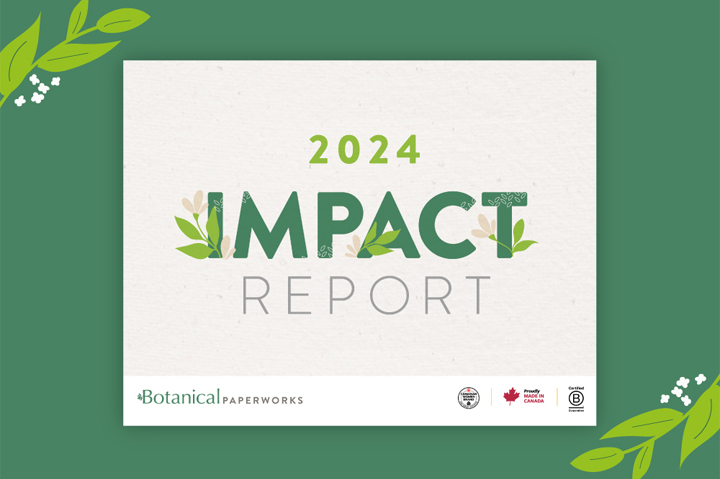Sustainability June 12, 2025
Botanical PaperWorks Highlights Sustainability Gains in 2024
The Canadian supplier’s first impact report details strides forward in composting, water reuse and carbon tracking following its B Corp certification last year.
Key Takeaways
• B Corp: Botanical PaperWorks (asi/41273) received B Corp certification in 2024, earning top marks in environmental impact for its sustainable products and practices.
• Tracking Impact: The company’s inaugural impact report outlined measurable progress in composting, water reuse and carbon emissions tracking, establishing a baseline for future sustainability goals.
2024 was a blooming year for sustainability at Botanical PaperWorks (asi/41273).
Most significantly, the Canadian-based supplier earned a B Corp certification in June 2024, scoring highest in the environment category, which assessed the supplier’s eco-friendly products and solutions countering environmental challenges.
But the company’s first-ever impact report showed off some of the smaller scale ways it’s making sustainable change.
“We believe that better is always possible, and doing better is simply the right thing to do,” the report said.
In 2024, the company increased its composting volume by 80% and launched a program that reused more than 10,000 liters of water. Botanical used an average of about 0.8 liters for every A4 letter size sheet of paper – well below the industry standard of 13 liters for the same size.
More than 90% of Botanical’s product offerings – including biodegradable seed paper that can be grown into wildflowers, herbs or vegetables – are made using supplies from waste streams. With ongoing giveback programs through select products, the company donated more than $2,500 to the nonprofits Oceana and PFLAG in 2024. And it recycles about 20 metric tons of paper waste into seed paper annually, and composts or repurposes most seed paper offcuts.
Last year, Botanical also shifted to a new carbon tracking system that measures carbon emissions on a more granular level. It now uses activity-based accounting rather than cost-based, the latter of which relies on financial expenditures instead of real-world operational data. Going forward, 2024 will be the company’s baseline for comparisons.
The supplier tracked that it contributed close to 150 tons of carbon dioxide through indirect emissions like business travel or supply chain, more than 12 tons of direct greenhouse gas emissions and less than 1 ton of electricity-generation emissions, according to the report.
Next year, the company plans to reduce its use of water, electricity and raw materials; decrease landfill waste; host a community litter cleanup; and launch a giveback program for Earth Day products.

Promo for the Planet is your destination for the latest news, biggest trends and best ideas to help build a more sustainable and socially-responsible industry.

